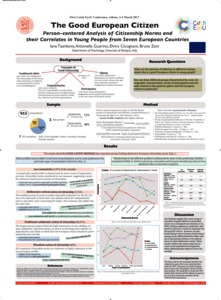Tzankova, Iana ; Guarino, Antonella ; Cicognani, Elvira ; Zani, Bruna
(2017)
The good European citizen: Person-centred analysis of citizenship norms and their correlates in young people from eight European countries.
In: First CATCH-EyoU Conference, 2-4 Mar 2017, Athens, Greece.
Full text disponibile come:
![[thumbnail of Academic poster in pdf]](https://amsacta.unibo.it/6131/1.hassmallThumbnailVersion/2017_CATCH_Poster.pdf)  Anteprima |
Documento di testo(pdf) (Academic poster in pdf)
Licenza: Salvo eventuali più ampie autorizzazioni dell'autore, il contributo può essere liberamente consultato e può essere effettuato il salvataggio e la stampa di una copia per fini strettamente personali di studio, di ricerca e di insegnamento, con espresso divieto di qualunque utilizzo direttamente o indirettamente commerciale. Ogni altro diritto sul materiale è riservato.
Download (1MB)
| Anteprima
|
Abstract
Within the academic debate about good citizenship, several authors have emphasized different possible notions – such as adhesion to more traditional-elitist, solidarity-based or participative norms (Denters, Gabriel, & Torcal, 2007). Recently, scholars have proposed the use of person- centred approaches to analyze typologies of good citizenship conceptions (Hooghe, Oser & Marien, 2016; Reichert, 2016). The existing studies have not addressed until now the European political context or investigated ideas of good citizenship related to a supranational level. The present study examines by means of latent profile analysis young people’s patterns of adhesion to different notions about what is a good European citizen and investigates how the different groups are characterized by socio-demographic characteristics, levels of participation and perceptions of belonging or political alienation related to the European context. The study is part of the Catch-EyoU project and uses the pilot questionnaire data with a sample of 994 respondents from two age groups –adolescents (16-19 years old, 52.7%) and young adults (20-26 years old, 47.3%)– collected in eight European countries. The results identified five different profiles that distinguished between youth who held a mixed conception of the good European citizen (where different normative ideas coexist), groups that emphasized a particular view and a pattern of low adhesion to all theorized conceptions. While most respondents give high importance on both traditional and more participative norms, the findings confirm the existence of comparatively more passive views and of a critically oriented group differentiated by more negative perception of the European context.
Abstract
Within the academic debate about good citizenship, several authors have emphasized different possible notions – such as adhesion to more traditional-elitist, solidarity-based or participative norms (Denters, Gabriel, & Torcal, 2007). Recently, scholars have proposed the use of person- centred approaches to analyze typologies of good citizenship conceptions (Hooghe, Oser & Marien, 2016; Reichert, 2016). The existing studies have not addressed until now the European political context or investigated ideas of good citizenship related to a supranational level. The present study examines by means of latent profile analysis young people’s patterns of adhesion to different notions about what is a good European citizen and investigates how the different groups are characterized by socio-demographic characteristics, levels of participation and perceptions of belonging or political alienation related to the European context. The study is part of the Catch-EyoU project and uses the pilot questionnaire data with a sample of 994 respondents from two age groups –adolescents (16-19 years old, 52.7%) and young adults (20-26 years old, 47.3%)– collected in eight European countries. The results identified five different profiles that distinguished between youth who held a mixed conception of the good European citizen (where different normative ideas coexist), groups that emphasized a particular view and a pattern of low adhesion to all theorized conceptions. While most respondents give high importance on both traditional and more participative norms, the findings confirm the existence of comparatively more passive views and of a critically oriented group differentiated by more negative perception of the European context.
Tipologia del documento
Documento relativo ad un convegno o altro evento
(Poster)
Autori
Settori scientifico-disciplinari
DOI
Data di deposito
14 Mar 2019 08:13
Ultima modifica
14 Mar 2019 08:13
Nome del Progetto
Programma di finanziamento
EC - H2020
URI
Altri metadati
Tipologia del documento
Documento relativo ad un convegno o altro evento
(Poster)
Autori
Settori scientifico-disciplinari
DOI
Data di deposito
14 Mar 2019 08:13
Ultima modifica
14 Mar 2019 08:13
Nome del Progetto
Programma di finanziamento
EC - H2020
URI
Statistica sui download
Statistica sui download
Gestione del documento:



 Login per gli autori
Login per gli autori



